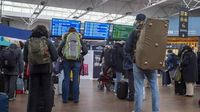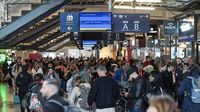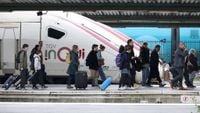On Friday, May 9, 2025, the SNCF controllers' strike began, coinciding with a long holiday weekend in France. Despite the significant participation of the workforce in this labor action, the railway company reported that most trains were running on time. According to SNCF management, 96% of TGV services were expected to operate normally throughout the weekend, a claim that was met with skepticism by union representatives.
Approximately 60% of on-board supervisors declared themselves on strike on the TGV on the first day of the action. At the Gare de Lyon in Paris, all departing trains were confirmed to be on schedule by 5:30 PM, illustrating the company's ability to maintain service despite the strike. SNCF's strategy involved deploying volunteer executives who had undergone special training to fill in for striking supervisors, allowing the trains to keep running.
The strike, called by the SUD-Rail union and supported by the Collectif national ASCT (CNA), is aimed at securing a raise in work bonuses and better scheduling practices, which the workers claim are often altered at the last minute. The union's secretary, Julien Troccaz, criticized the company's measures, stating, "The company is pouring oil on the fire and risks regretting it," referring to the tactics used to undermine the strike.
While the SNCF assured travelers that they could still reach their destinations as planned, the union maintained that the company's efforts to minimize disruptions were a direct attempt to weaken the strike's impact. Troccaz claimed that the railway's management was attempting to "break the strike by offering €50 per hour to volunteers who would replace strikers, while those on strike would lose money." This sentiment was echoed by other union leaders, who expressed frustration over the perceived injustice of the situation.
As for regional train services, disruptions were noted in several areas, although TGV services remained largely unaffected. In the Hauts-de-France region, for example, the SNCF warned of potential difficulties, anticipating that only one in two regional trains would operate normally. Meanwhile, in the Pays Basque, no trains were running due to ongoing track renewal work.
The SNCF's management projected that the strike rate would increase slightly on Saturday, May 10, before returning to Friday's levels on Sunday, May 11. They also pledged to provide a 50% discount voucher for travelers whose trains were canceled, aiming to mitigate customer dissatisfaction.
Looking ahead, the CGT-Cheminots union has already planned further mobilization efforts for June 4, 5, and 11, 2025. These upcoming strikes will focus on various demands, including salary increases and improved working conditions. The union's call for action coincides with a round table discussion about the bonuses received by drivers, indicating that the labor dispute is far from over.
The ongoing strike highlights the tensions between SNCF management and its workforce, as workers express their frustration over compensation and working conditions. Troccaz emphasized the legitimacy of their demands, stating, "When we have more than 60% of strikers, it is clear that the anger is significant since thousands of colleagues are losing money this weekend." This sentiment underscores the broader issues at play within the French railway system.
As the strike continues, the SNCF's ability to maintain service levels will be closely monitored, with many travelers relying on the railway for their holiday plans. The situation serves as a reminder of the delicate balance between labor rights and operational demands within the transportation sector.
Overall, the strike by SNCF controllers marks a significant moment in the ongoing labor disputes within France's railway system. With further actions planned in the coming weeks, both the unions and the management will have to navigate this complex landscape to reach a resolution that satisfies the needs of workers while ensuring reliable service for passengers.






